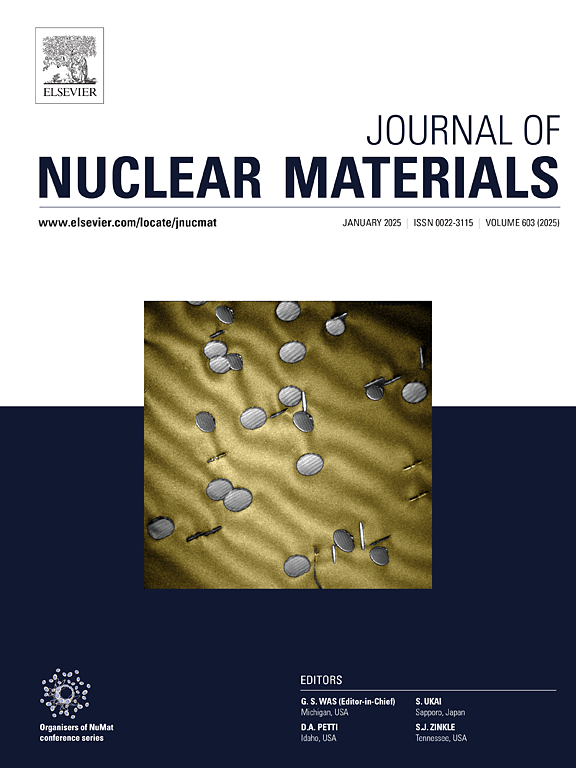Bulk, overlap and surface effects of swift heavy ions in CeO2
IF 2.8
2区 工程技术
Q3 MATERIALS SCIENCE, MULTIDISCIPLINARY
引用次数: 0
Abstract
Formation of tracks of swift heavy ions decelerating in the electronic stopping regime in CeO2 was studied, combining the Monte Carlo code TREKIS with molecular dynamics. We show that strong lattice disordering (melting) followed by structure recovery form finally a damaged ion track consisting of a discontinuous crystalline region in CeO2. Normal ion impacts result in appearance of spherical crystalline hillocks on CeO2 surface. The solid-vacuum interface strongly suppresses the recrystallization of the near-surface layers, forming conically shaped tracks with several tens of nanometers lengths. Grazing ion irradiation induces intensive material expulsion from the surface forming finally grooves surrounded by nanohillocks. The processes of surface nanostructures formation is similar to those observed previously in CaF2 which has the similar crystalline structure, however requires much longer recrystallization time. Recent experimental data confirm the simulation results.
快速重离子在 CeO2 中的块体、重叠和表面效应
我们结合蒙特卡洛代码 TREKIS 和分子动力学,研究了在二氧化 CeO2 中以电子停止状态减速的快速重离子轨道的形成。研究表明,在 CeO2 中,强烈的晶格无序化(熔化)和结构恢复最终形成了由不连续晶体区域组成的受损离子轨道。正常的离子撞击导致 CeO2 表面出现球形结晶丘。固体-真空界面强烈抑制了近表面层的再结晶,形成了长度为几十纳米的锥形轨道。掠过离子辐照诱导大量物质从表面排出,最终形成了由纳米丘环绕的沟槽。表面纳米结构的形成过程与之前在具有类似晶体结构的 CaF2 中观察到的过程相似,但需要更长的再结晶时间。最新的实验数据证实了模拟结果。
本文章由计算机程序翻译,如有差异,请以英文原文为准。
求助全文
约1分钟内获得全文
求助全文
来源期刊

Journal of Nuclear Materials
工程技术-材料科学:综合
CiteScore
5.70
自引率
25.80%
发文量
601
审稿时长
63 days
期刊介绍:
The Journal of Nuclear Materials publishes high quality papers in materials research for nuclear applications, primarily fission reactors, fusion reactors, and similar environments including radiation areas of charged particle accelerators. Both original research and critical review papers covering experimental, theoretical, and computational aspects of either fundamental or applied nature are welcome.
The breadth of the field is such that a wide range of processes and properties in the field of materials science and engineering is of interest to the readership, spanning atom-scale processes, microstructures, thermodynamics, mechanical properties, physical properties, and corrosion, for example.
Topics covered by JNM
Fission reactor materials, including fuels, cladding, core structures, pressure vessels, coolant interactions with materials, moderator and control components, fission product behavior.
Materials aspects of the entire fuel cycle.
Materials aspects of the actinides and their compounds.
Performance of nuclear waste materials; materials aspects of the immobilization of wastes.
Fusion reactor materials, including first walls, blankets, insulators and magnets.
Neutron and charged particle radiation effects in materials, including defects, transmutations, microstructures, phase changes and macroscopic properties.
Interaction of plasmas, ion beams, electron beams and electromagnetic radiation with materials relevant to nuclear systems.
 求助内容:
求助内容: 应助结果提醒方式:
应助结果提醒方式:


